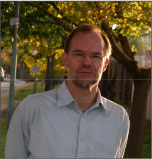Serviços Personalizados
Artigo
Indicadores
Links relacionados
-
 Citado por Google
Citado por Google -
 Similares em Google
Similares em Google
Compartilhar
Indo-Pacific Journal of Phenomenology
versão On-line ISSN 1445-7377
versão impressa ISSN 2079-7222
Indo-Pac. j. phenomenol. (Online) vol.14 no.1 Grahamstown Jan. 2014
Christopher R. Stones
Editor-in-Chief
This first edition of 2014 comprises five papers plus the usual book review and, as in previous editions, the authorship is characterised by an international flavour with authors from Sweden, South Africa and the USA. The scholarly topics range from a philosophical engagement with the notion of the centrality of 'perception' rather than 'reflection' in the activity of skilful professional practice, through to the therapeutic use of imagery in supportive counselling contexts as well as the interesting notion that there is an appropriate and effective role in therapy for the therapist's experience to be made explicit within a client-centred context. There is also a paper arguing that creativity is not simply a matter of will and discipline but instead requires receptivity and openness and, moreover, that these elements should be the hallmarks of all good research, while the final paper is an exploration of the crucial intersection of culture and science in traditional medicine models.
This edition opens with a paper by Peter Erlandson entitled 'Reflection and Perception in Professional Practice' where it is argued that a significant element in the development of practitioner competence and 'skilfulness' has not so much to do with the notion of 'reflectiveness' as is the traditional conceptualization of professional skilfulness but rather is related to the spontaneous flow of perceptions within the professional work context.
The next paper, which is a Phenomenological Case Study of the Therapeutic Impact of Imagery (by Anita Padmanabhanunni and David Edwards), serves as an exemplar of the power of an emotion focused intervention to facilitate the disclosure of a deeper memories and emotional states thus allowing them to be transformed through an organic healing process.
"Being used as a Mouthpiece: Mutual Recognition during Parental Feedback" (by Melissa card) is a psychoanalytic conceptualisation of the therapeutic process which incorporates the therapist's experience of being in the therapeutic space while the concept of 'mutual recognition' is explored phenomenologically. The experiences of both the therapist and the patient are brought to life through an integrated intertwining of psychoanalytic theory and phenomenological experience.
The fourth paper, by Steen Halling (The Phenomenon as Muse: On being Open to "Friendly Invasion"), explores the idea that reflection, reverie, and puzzlement amongst other, often spontaneous and evolving research dialogues, are central to the endeavour of the rigorous quest to better understand the world around us, and that creativity is not simply a matter of will and discipline but instead requires receptivity and openness.
The final research based paper in the current edition entitled "The Intersection of Culture and Science in South African Traditional Medicine" (by Jean-Francois Sobiecki) argues that traditional African medicine tends to be perceived as being irrational and ungrounded in any scientific methodology because of the failure to understand African traditional medicine concepts as being primarily metaphorical descriptions of biological and psychological effects, this misunderstanding perhaps arising from the colonial past. Consequently, African traditional medicine concepts are incorrectly understood to reflect mysticism and superstition with little or no scientific basis. Sobiecki argues that the challenge for scientists is to correctly interpret cultural and language-based descriptions of spiritual medicinal plant use in order to understand the efficacy that these cultural healing practices truly have.
The present compilation concludes with a book review by Graham du Plessis of Eugene DeRobertis' work which is entitled "Existential Phenomenological Psychology: A Brief Introduction".
In concluding this introductory editorial I wish to stress the invaluable role played by the reviewers of the papers in this edition who gave willingly and freely of their time and expertise in their commitment to ensuring that only the most theoretically coherent papers are published in the IPJP.
On behalf of the Editorial Board I wish to thank not only the reviewers for their commitment and dedication in serving the journal's pursuit of academic excellence but also the authors whose writings serve to further the endeavours of the phenomenological approach, and finally the many readers without whom this journal and its initiatives would come to naught!
Referencing Format
Stones, C. R. (2014). Editorial. Indo-Pacific Journal of Phenomenology, 14(1), 2 pp. doi: 10.2989/IPJP.2014.14.1.1.1233
About the Author

Professor Christopher Stones, previously of Rhodes University in Grahamstown, South Africa and Professor of Psychology in the Faculty of Humanities at the University of Johannesburg, has enjoyed a lengthy academic and research career, in the course of which he has taught in the areas of physiological, clinical, forensic, social, and research psychology. He is Vice-President of the South African Association for Psychotherapy and past Chairman of the South African Society for Clinical Psychology. Editor-in-Chief of the Indo-Pacific Journal of Phenomenology since 2003, he is also on the editorial panels of two other online journals. Using both natural scientific quantitative methodologies and phenomenological approaches, Professor Stones's research interests are in the areas of identity, attitudes and attitude change, phenomenological praxis and methodologies, abnormal psychology and psychotherapy, spirituality and religious experience, in all of which areas he has published extensively. An Associate Fellow of the British Psychological Society, with which he is also registered as a Chartered Psychologist, Professor Stones is registered with the Health Professions Council of South Africa as both a research and a clinical psychologist, and conducts a part-time clinical practice with particular focus on adolescents, young adults and families, as well as offering long-term psychotherapy. In addition, he is regularly called on to serve as an "expert witness" in medico-legal (civil and criminal) court proceedings, and to contribute as a consultant in the field of forensic investigation. E-mail address: editor@ipjp.org














